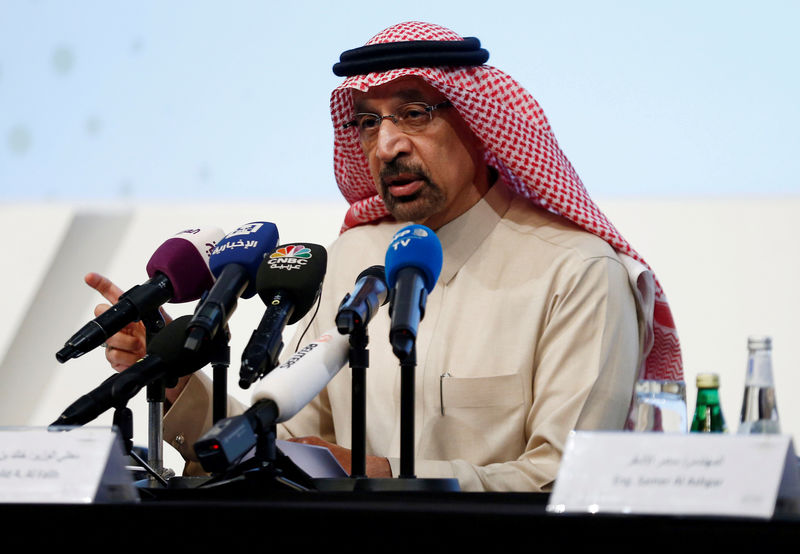By Nidhi Verma
NEW DELHI (Reuters) - Saudi oil minister Khalid al-Falih said on Sunday it would be too early to change OPEC+ output policy at the group's meeting in April and that China and the U.S. would lead healthy global demand for oil this year.
The Organization of the Petroleum Exporting Countries and its allies such as Russia -- known as the OPEC+ alliance -- will meet in Vienna on April 17-18, with another gathering scheduled for June 25-26.
Falih said the group was unlikely to change its output policy in April and if required would make adjustments in June.
"We will see what happens by April, if there is any unforeseen disruption somewhere else, but barring this I think we will just be kicking the can forward," Falih said.
"We will see where the market is by June and adjust appropriately," Falih said after a meeting with Indian oil minister Dharmendra Pradhan in New Delhi.
OPEC member United Arab Emirates (UAE) said on Sunday it would continue to meet its obligations to cut supply under the producer agreement.
"We will continue to deliver on the OPEC & Non-OPEC commitment for voluntary production adjustments until the global market is re-balanced," Minister of Energy and Industry Suhail al-Mazrouei said on Twitter.
On Jan. 1, OPEC+ began new production cuts to avoid a supply glut that threatened to soften prices. The group agreed to reduce supply by 1.2 million barrels per day (bpd) for six months.
Sources recently said the most likely scenario is that the current supply cuts will be extended in June but much depends on the extent of U.S. sanctions on OPEC members Iran and Venezuela.
OPEC's share of the cuts is 800,000 bpd, to be delivered by 11 members -- all except Iran, Libya and Venezuela, which are exempt. The baseline for the reduction was in most cases their output in October 2018.
For Saudi Arabia, the world's top oil exporter, Falih said output in April was expected to remain at this month's level of 9.8 million bpd.
"Aramco is finalizing their April allocations today or tomorrow so we will know more on Monday. But my expectation is that April is going to be pretty much like March".
GLOBAL OIL DEMAND
Falih said total global oil demand is set to grow by around 1.5 million bpd this year.
"If you look at Venezuela alone you would panic, if you look at the U.S. you would say the world is awash with oil. You have to look at the market as a whole. We think 2019 demand is actually quite healthy," Falih told Reuters.
In Venezuela, suffering from a political and economic crisis, oil exports have plunged 40 percent to around 920,000 bpd since Washington slapped sanctions on its petroleum industry on Jan. 28.
On the other hand, production in U.S. hit a record of more than 12 million bpd in February.
The International Energy Agency last month left its demand growth forecast for 2019 unchanged from January at 1.4 million barrels per day.
Falih said Chinese demand was breaking records month after month and estimated the country would breach 11 million bpd this year.
He also said that along with China and the U.S., India's expanding economy was driving global oil demand growth.
After the meeting, India's oil minister said he wanted Saudi Arabia to play an active role in keeping oil prices at a reasonable level as rising prices affect the Indian economy.
He also invited Saudi Arabia to partner with India in building strategic oil reserves and further invest in India's refining and Petrochemical sectors.
